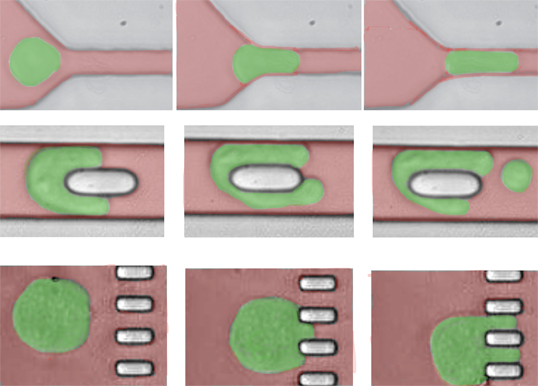Dr. Siva Vanapalli Awarded $674,000 CPRIT Grant to Develop Microfluidic Methods to Analyze Cancer Cells
By Amanda Miller

Dr. Charles Saxe and other experts of the American Cancer Society say that upwards of 90 percent of all cancer-related suffering and death is associated with the spreading nature of cancerous tissue. That is, once cancer cells achieve access to the bloodstream, they travel and spread to other areas of the body, even creating new tumors. This process of cancer spreading throughout the body, also known as metastasis, accounts for most of the disease's morbidity.
Recently, microfluidics — the science concerned with the design and understanding of systems in which small volumes of fluids flow through microchannels — has been applied to cancer research, and the results have been quite promising. For example, it is now possible to take blood samples from cancer patients and pinpoint individual cancer cells within them. Researchers have developed a microfluidic system to "catch" cancer cells as the blood sample passes through the device enabling detection of early-stage metastasis.
But microfluidics may have the potential to be applied even further. Cancer cells are known to effectively "flow" through the blood once access to the bloodstream has been achieved. Blood flow presents shear stress and other forces which could damage the cells before they can reach another part of the body and wreak havoc. Then, once the deadly cells reach a destination, they "squeeze" through other tissues until they lodge, grow, and create new tumors where none previously existed. The ability of a cancer cell to spread, then, is an immediate result of the cell's ability to flow. This could be affected by factors such as the size of the cell, the characteristics of the cell's surface, or the cell's deformability (how soft or firm the cell remains as it passes through blood and other tissue). However, how would one measure the deformability, or the firmness, of a 10-micron thick tumor cell? Microfluidics may provide an answer.
With this new and novel perspective regarding the metastasis of cancer cells being dependent on their deformability, Dr. Siva Vanapalli, associate professor of chemical engineering, plans to develop new microfluidic methods that will harness deformability as a biomarker of cancer cells. He has received an Individual Investigator Research Award of $674,465 from the Cancer Prevention Research Institute of Texas to pursue this research. Vanapalli plans to construct a microfluidic device which mimics the structure of capillary beds in the body. Individual cancer cells will then be "squeezed" through the device and analyzed beneath a microscope. The analysis answer such questions as "will the cancer cells get fractured or damaged as they are pushed through?", "will the cancer cells break apart under different shear stresses and other forces?", or "will the cancer cells remain intact and pass through the device unharmed?" With this information, Vanapalli would be able to use deformability as a marker to differentiate cancerous cells from their healthy counterparts, and cancer cells that can spread from those that cannot. It may then become possible to pinpoint characteristics cancer cells must have in order to become the deadliest of their kind — cells that are able to spread or flow throughout other tissue.
In the future, once these vital characteristics have been identified, it may be possible to create drugs that have immediate effects on cancer cells' deformability. These drugs could then prevent the spread of cancer cells, to perhaps be used in tandem with those that destroy existing tumors. This research constitutes a fundamentally different approach, and represents a paradigm shift to studying physiological factors of cancer as opposed to research only on a cellular or genetic level. There also is the potential to utilize the methods developed to screen for new drugs before testing in clinical trials. Lastly, Vanapalli's research leads the way to a future where affecting the physical properties of cancer cells can rid patients of the disease as well as previously common side effects, and perhaps finally a significant change in cancer survival rates.

Grant Title:
Engineering Microfluidic Devices for Multimodal Mechanical Phenotyping of Tumor Cells in Flow
Edward E. Whitacre Jr. College of Engineering
-
Address
100 Engineering Center Box 43103 Lubbock, Texas 79409-3103 -
Phone
806.742.3451 -
Email
webmaster.coe@ttu.edu
